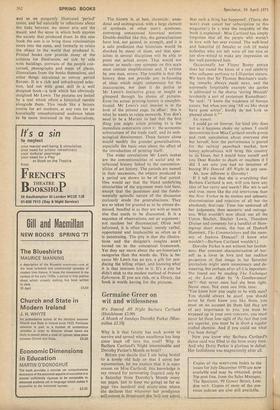Germaine Greer on wit and witlessness
A Month of Sundays Dorothy Parker (Mac- millan £2.10)
Why is it that fatuity has such power to survive and spread when excellence has long since leapt off into the void? Why is Barbara Cartland's' Night interminable and Dorothy Parker's Month so brief?
Before you decide that I am being brutal to a lovely old lady or that I covet her aquamarines, let me explain -that it is open season on Miss Cartland; this knowledge is my reward for persevering (regaled only by a Saturday from Dorothy's Month every ten pages, just to keep me going) as far as page two hundred and ninety-nine where she declares that whenever her prodigious self-esteem is threatened she 'will not admit
that such a thing has happened'. (There, she won't even cancel her subscription to this magazine I) In a trice the insipidity of the book is explained: Miss Cartland has simply forgotten that all the people who weren't
in love with her ever existed. The well-bred and beautiful (if female) or rich (if male) nobodies who are left were all too nice or too slow-witted to make any impression on her well-powdered hide.
Occasionally her Flopsy Bunny syntax does lap round the knees of a real celebrity who collapses perforce to Lilliputian stature.
We learn that Sir Thomas Beecham's scath- ing remarks always made news, and the supremely forgettable example she quotes is addressed to the chorus 'during Messiah' (evidently a sort of protestant Ramadhan): `he said: "I know the weakness of human nature, but when you sing 'All we like sheep have gone astray', kindly do' not look so pleased about it."' Sic transit.
I could go on forever, for kind pity does not as it happens choke my spleen. I could demonstrate how Miss Cartland retails gossip and rank speculation about everyone else but herself, how the performance is geared for the railway paperback market, how honey aphrodisiacs will bring this country to its knees, but I would bore myself and
you Dear Reader to death or mayhem if I did. I am sure you had no intention of buying We Danced All Night in any case. Alt, how different is Dorothy!
If I tell you that she is everything that Barbara Cartland is not, will you have any idea of her rarity and worth? Her wit is sad
and true, more like the old SPECTATOR than the New Yorker in its tireless and splenetic
discrimination and rejection of all but the absolutely first-rate. Time has endorsed all her judgments, then eccentric and outrage- ous. Who wouldn't now chuck out all the Upton Sinclair, Sinclair Lewis, Theodore Dreiser and company for a handful of Hem- ingway short stories, the best of Dashiell Hammett, The Counterfeiters and the mem- ory of Isadore Duncan? (I know who wouldn't—Barbara Cartland wouldn't.) Dorothy Parker is not without her foolish- ness. Her constant characterisation of her- self as a lover in love and her reckless projection of that image in her Saturday journalism might seem unnecessary and de- meaning, but perhaps after all it is important. She found out by reading The Technique of the Love Affair by 'A Gentlewoman' (nc?1 that never once had she been right. Never once. Not even one little time:
'You know how you ought to be with men? You should always be aloof, you should never let them know you like them, you must on no account let them feel they are of any importance to you, you must be wrapped up in your own concerns, you must never let them lose sight of the fact that you are superior, you must he in short a regular stuffed chemise. And if you could see what I've been doing!'
Now you know why Barbara Cartland's dance card was filled to the brim every time. And why Dotty Parker is glorious in defeat. Her foolishness was magnanimity after all.










































 Previous page
Previous page